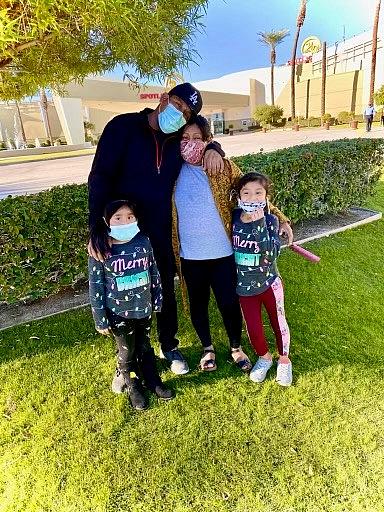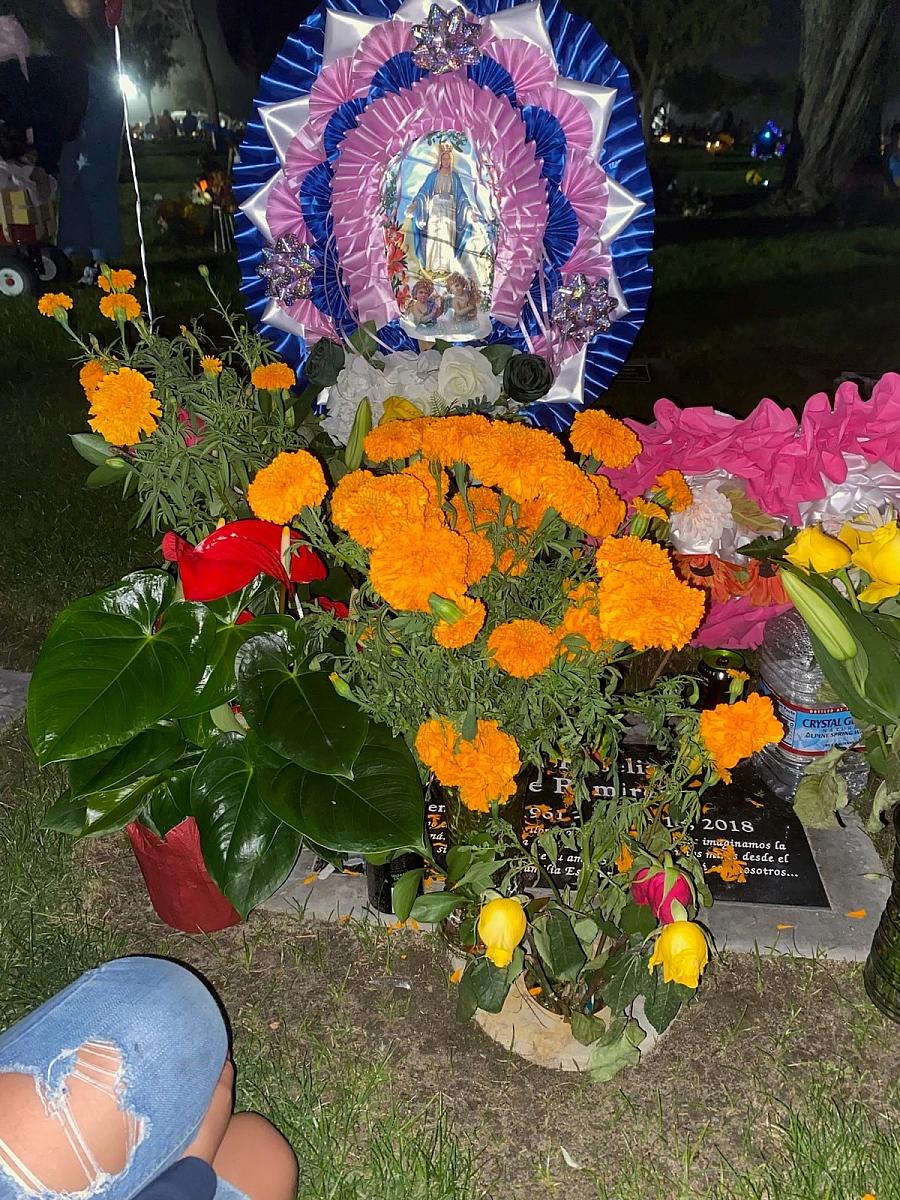Valley of Loneliness
The story was co-published with Los Angeles Univision 34 as part of the 2024 Ethnic Media Collaborative, Healing California.

Dionisia Martinez, 39 years old, is from Michoacán, Mexico. Dionisia works in the vegetable fields in Coachella Valley and has 4 children.
Courtesy Dionisia Martinez

At six in the morning, not even the sun accompanies the farmworkers who spend their days cultivating the farmlands in Coachella Valley. They are men and women of all ages, many of them undocumented, from low-income backgrounds who face long working hours. Their callused hands show their commitment to pursue the promise of a better life.
The beautiful views of the vast valley hide a secret among its landscapes — loneliness.
Dionisia Martinez, 39 years old is native to P'urhépecha, from the center of Michoacán, Mexico. She works in the vegetable fields of the valley and has four children. One year ago, her world changed due to lack of resources and troubles that broke her spirit.

Dionisia Martinez with her husband and young children
Courtesy Dionisia Martinez
She and her husband were day laborers and often could not find work. “Sometimes we would go asking for work and they would say no because they were already full or they just needed so many people and that they were already full.”
They felt abandoned.
Dionisia noticed that her husband, Bonifacio Mulato, would cry often and she’d ask “Why? But he wouldn’t say anything.
When her husband took his own life, Dionisia felt like a madwoman. “Why did he do that? Why did he leave me? He told me he would never leave us and that he would never do anything. And now he left me alone with the children." They had been married for 24 years and dreamed of returning to Mexico together.
Desperation was so great that the idea of taking her own life also crossed Dionisia's mind.
She felt she couldn’t handle the children alone, that she wouldn’t be able to pay rent, water electricity bills and buy clothes for her children and she thought of dying too.
Sometimes she would wake up at night and look at her boys and girls, and wonder what would happen if she left them, what would they do? That's why she decided to carry on and fight.
Dr. Luz Gallegos from the Todec organization said that mental health is a growing issue in this community. “We've had strong cases where these workers fall into depression, men who are used to working and providing for their family, who have taken their own lives because of this health issue, mental health that is shattered.”
With work that’s not guaranteed, housing not secure and health situations worsening, in addition to the lack of access to medical care, the situation becomes increasingly dire for many.
Doctor Eva Perusquia, an internist at the Salinas Health Clinic in California who has been serving the farmworker community in Monterey county for 15 years, said that many of them are fleeing from extremely violent situations from back home. “So, in addition to that, we impose another stigma on them, that they feel depressed, that they are sad, that they cannot function, or that they are truly depressed with a tendency toward suicide," and they don’t have the option to return home.
“So, all these factors worsen that grief, that normal homesickness, to make them enter an extreme situation that can then indeed trigger total depression,” said Dr Perusquia.
In the Latino community, there is mental health stigma to contend with, too.
Political hostility and cultural values have made it more difficult to be vulnerable. Especially for men, who are socialized to silence loneliness and pain, the pressure to live behind a mask can be the most paralyzing.
"Women are much more concerned about the future, about their children, about the economy, about family, about housing. Men are more concerned about being providers, about having the means to continue sending money to their families in their countries or to be able to provide them with a home,” said Dr Perusquia. And more and more men are falling into depression, “often resorting to alcohol or stimulant beverages. These energy drinks are only causing them severe palpitations and making them feel even worse. Unfortunately, many of them already in a depression situation highly consider taking their own lives,” said Dr Perusquia.
Immigrant and low-income communities experience different concerns than other workers.
“We see it daily in the fields and we see it more in vulnerable communities that are the farm-worker communities, undocumented communities that all stem from the crisis of money, of work, because that's the root of these problems,” said Dr. Gallegos.
“When fieldworkers migrate to this country, it's for the American dream and to work.” They don't come to ask why; they pour their sweat and life in the furrow.
According to Dr. Gallegos, "If there's no work, there's no food, no money for rent. So people fall into a very deep depression."
Communities of color experienced disproportionate impacts on mental health due to COVID-19, specifically the mental health aftermath resulting from exposure, cumulative burden, and isolation.
"If we don't work, we don't eat. And how can we, in our conscience, let this happen; people who harvest food for everyone. Sometimes when times are tough, they don't even have money to feed their own children,” said Dr. Gallegos.
In Coachella Valley, several field workers shared their concerns.
JULIA (FARMWORKER): "We're more or less hanging on. The pandemic, yes, it affected us. For the family. I was somewhat traumatized... Yes, anxiety, stress."
LAURA (FARMWORKER): "Life in the fields is not easy."
"Sometimes it's not enough. And everything has gone up now."
CARLOS (FARMWORKER): "There are people who, yes, sometimes when they're alone here without their family, well, yes, they seem a bit nostalgic."
For Dionisia, these feelings were not unfamiliar. "I used to arrive early sometimes. And no, I wouldn't go inside. I wasn't afraid, but it's like I felt lonely and like I don't know what I was thinking."
Her oldest son, now over 18, made a difficult decision to leave school and help with expenses.
The stress and anxiety of parents have emerged as silent factors that can leave a lasting mark on their children's lives.

Flowers at a memorial for Dionisia's husband
"We're seeing more and more children who are having a lot of difficulties in school, a lot of depression among young people. We've had young people who have taken their own lives. So this is about mental health. When children hear their parents say they won't be able to pay the rent, that they don't have money to eat," said Dr. Gallegos.
In many circumstances, after a devastating loss due to depression, family units get broken.
"We have children who get extremely anxious when it starts raining because they say if it rains hard, my mom and dad won't be able to go to work and they see the situation."
Dr Gallegos: "How can we let this happen to our children especially and children of farmers who dedicate their lives to work to feed the world?
The American Academy of Pediatrics conducted research on the impact of immigration-related stressors on the mental health of Latino children. There is a strong correlation between anxiety levels and uncertainties related to immigration status, family separation, and deportation fears.
Experts emphasize that changes in academic performance, sleep problems, and emotional behaviors should not be overlooked, as they can have long-term consequences on children's physical and emotional development.
We need to support those who are already falling into depression “to seek timely help and not leave them until the moment they are already trying to commit suicide,” urged Dr. Gallegos
"We don't have enough therapists to provide this support to patients to have these tools. We have support when they're already in depression, when they're already trying to commit suicide and sometimes not even then because they're overwhelmed."
Doctor Perusquia emphasizes the urgent need for specific interventions and support systems that combine culturally sensitive mental health services, community outreach, and school initiatives.
In 2023, California Senator Alex Padilla proposed several measures in the country's Senate to improve access to mental health care for agricultural workers, including implementing programs to train professionals in cultural competence and linguistic skills and establishing mobile mental health clinics in rural communities.
"We have to go where the community is, the most impoverished community, because that's where these resources should reach, because people aren't thinking about prevention, they're thinking about survival. So that's part of the work, but it's also the responsibility of these government agencies to reach the grassroots," said Dr. Gallegos.
The hope is that by creating awareness and fostering a comprehensive approach, we can stop the growing wave of anxiety and depression, offering the possibility of a more promising future for Latino workers in California and their children.
During difficult emotional times, individuals are encouraged to reach out for support by contacting 988.
This project is supported by the USC Annenberg Center for Health Journalism, and is part of “Healing California,” a yearlong Ethnic Media Collaborative reporting venture with print, online and broadcast outlets across California.

